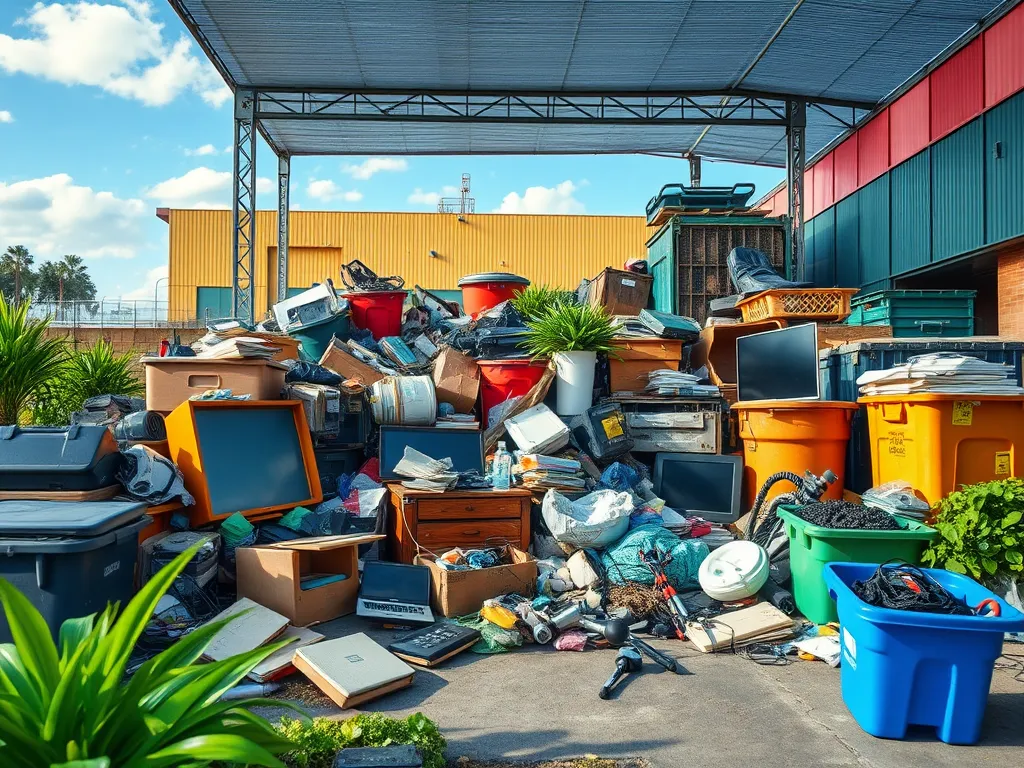Explore Emerging Trends in the Junk Removal Industry

Emerging Trends in the Junk Removal Industry
The junk removal industry has been experiencing significant transformations due to various forces shaping consumer behavior, environmental concerns, and technological advancements. As more consumers and businesses recognize the importance of a clutter-free environment, the demand for efficient junk removal services is on the rise. This article explores current trends in the junk removal industry, highlighting how companies are adapting to meet the needs of their clients while embracing sustainable practices.
One of the most prominent trends in the junk removal industry is the shift towards eco-friendly practices. With increasing awareness about the impact of waste on the environment, many junk removal services are adopting sustainable disposal methods. This not only helps reduce the overall waste sent to landfills but also promotes recycling and reusing materials whenever possible. Companies are now focusing on creating a circular economy by diverting recyclable materials and ensuring they are processed appropriately, thus contributing to a greener planet.
Another significant trend in the junk removal industry is the integration of technology. The use of mobile applications for booking services has simplified the process for consumers, allowing for quick scheduling and upfront pricing. Additionally, the implementation of GPS technology has enabled junk removal companies to optimize their routing for collections, thus improving efficiency and reducing operational costs. Innovations in waste sorting technology also play a crucial role in enhancing the overall effectiveness of junk removal services.
Customer service enhancements are becoming increasingly essential in the junk removal industry. More companies are focusing on personalized service offerings that cater to the unique needs of individual clients. Flexible pricing models are also being introduced, allowing customers to select services that best fit their budget. Improved communication strategies during collection, such as providing real-time updates and notifications, have greatly enhanced customer satisfaction and loyalty.
Market growth dynamics are another important aspect of the trends in the junk removal industry. The rapid pace of urbanization is driving the need for efficient junk removal services as cities become more densely populated. Moreover, there is a growing demand for decluttering services, particularly as minimalism and organization gain popularity in society. Trends in consumer behavior, such as a heightened awareness of environmental issues, are influencing how individuals and businesses approach junk removal.
According to insights from The World Bank, proper waste management is crucial for sustainable urban development.
Eco-Friendly Trends
Sustainable disposal methods are increasingly becoming a priority in the junk removal industry. Companies are focusing on responsible management of waste by researching and implementing environmentally friendly practices that minimize their carbon footprint. This includes sorting through items to separate recyclable materials, donating usable items to charitable organizations, and ensuring proper disposal of hazardous materials to prevent contamination.
Recycling initiatives are at the forefront of the eco-friendly trends within the junk removal industry. Many companies are now establishing partnerships with recycling facilities to ensure that as much waste as possible is processed and repurposed rather than ending up in landfills. This shift not only aligns with consumer expectations but also complies with stricter regulations regarding waste disposal.
Green certifications for junk removal services are gaining traction as a way to showcase commitment to environmentally friendly practices. Companies that meet specific sustainability standards can earn certifications that highlight their efforts to reduce waste and promote recycling. This not only garners consumer trust but also differentiates them from competitors in a crowded market.
Technology Integration
The use of mobile apps for booking junk removal services is revolutionizing the way consumers interact with providers. These apps allow customers to schedule pickups at their convenience, receive estimates, and even track the progress of their service in real-time. This level of transparency and accessibility enhances customer experience and streamlines operations for service providers.
Implementing GPS for efficient routing is another technological advancement that has transformed the junk removal industry. Companies can now optimize their collection routes, which reduces fuel consumption and ensures timely service delivery. This not only enhances operational efficiency but also minimizes the environmental impact associated with transportation.
Innovations in waste sorting technology are significantly improving the capabilities of junk removal companies. Advanced sorting equipment can automatically differentiate between various materials, allowing for more efficient recycling processes. This technology helps in increasing the volume of materials that can be recycled and significantly reduces time spent sorting manually by employees.
Customer Service Enhancements
Personalized service offerings are a notable trend in enhancing customer service within the junk removal industry. Companies are increasingly tailoring their services based on individual customer needs and preferences, offering options that range from specific item removal to comprehensive estate cleanouts. This customization not only improves customer satisfaction but also builds long-term relationships by addressing customer pain points effectively.
Flexible pricing models are gaining popularity as customers seek options that align with their budgets. Many junk removal services are offering a range of pricing structures, including pay-per-item, flat rates, and hourly rates. This adaptability allows customers to choose a payment plan that works best for their financial situation while ensuring transparency in pricing.
Improved communication strategies during collection play a crucial role in customer satisfaction. Junk removal companies are adopting modern communication tools to provide clients with notifications, updates, and confirmations regarding their service. This proactive approach not only keeps customers informed but also establishes trust and credibility with service providers.
Market Growth Dynamics
The impact of urbanization on junk removal is profound. As cities expand and populations grow, the amount of waste generated increases, prompting a higher demand for junk removal services. Urban consumers are seeking professional help to manage their clutter, which presents enormous growth opportunities for junk removal companies willing to adapt to urban environments.
The demand for decluttering services is another emerging facet of the junk removal industry. Many individuals are embracing the minimalist lifestyle, driving a need for services that assist in clearing out unwanted belongings. This trend is particularly potent in urban areas where space is limited, and residents are looking for efficient ways to manage their possessions.
Trends in consumer behavior towards junk removal are heavily influenced by a growing environmental consciousness. Consumers are increasingly seeking out providers who demonstrate a commitment to sustainability and eco-friendly practices. This shift in behavior compels companies to adopt greener practices to attract and retain customers.
Regulatory Changes
The impact of new waste management laws is reshaping the landscape of the junk removal industry. Stricter regulations focused on waste reduction, recycling, and hazardous material disposal are prompting junk removal companies to adjust their operations to remain compliant. Understanding and adapting to these regulations is crucial for businesses seeking to thrive in this evolving environment.
Compliance requirements for junk removal companies are becoming more stringent as government authorities impose greater accountability on waste management practices. Companies must invest in training and resources to ensure they meet these standards, which contributes to the overall professionalism and reliability of the industry.
The future of landfill regulations is anticipated to increasingly focus on reducing the amount of waste sent to landfills. As landfill space becomes more scarce and regulations tighten, junk removal services will need to prioritize sustainable practices, recycling initiatives, and community involvement to remain viable and competitive in the marketplace.
